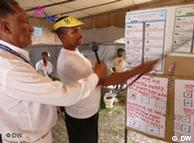The Perils of Reporting in Sudan

Katy Glassborrow
IWPR reporter
As I kiss my baby before he falls asleep every night, my thoughts always return to Abdelrahman. My colleague has a boy the same age as mine, and a girl of two years old. But he hasn’t kissed them goodnight for two weeks now.
Abdelrahman was arrested on October 30 by the security services in Khartoum. No-one knows where he is being held. As a consequence of operating as an independent journalist, he has been accused of crimes against the state - an extremely serious offence in Sudan. His wife is worried. His kids want to see their dad.
I met Abdelrahman a few years ago whilst he was being trained by Radio Dabanga - a project run by Press Now and supported by IWPR – which is dedicated to bringing impartial news to information-starved Darfur. I ran sessions on international justice reporting, and have been lucky enough to work with the Radio Dabanga team ever since, producing a weekly radio show called Fi al Mizan about justice in Darfur.
I approached one session, on reporting on sexual violence, with particular trepidation. How would an all-male group respond to talking openly about such a taboo subject, which had undoubtedly affected their friends and families?
Their professionalism and empathy was overwhelming. In role-play interviews, I was humbled by their sensitivity, compassion and objectivity.
Abdelrahman came to me afterwards. “This is really very serious,” he said quietly. “We must make programmes about this issue.”
Since then, the Radio Dabanga journalists, who drink sugary tea together and greet each other enthusiastically every morning, have worked tirelessly to bring the highest-quality news to Darfur. They are forced to operate out of a newsroom in Holland because censorship and the ever-present security services in Sudan make it virtually impossible to publish or broadcast the truth without being punished.
I've been to the National Press Council offices in Khartoum where newspapers are censored. I've talked to the censors themselves, who explained the need for journalists to respect “red lines” and protect Sudanese traditions. I've spoken to the head of the journalists’ union who showed me a lengthy list of journalists employed by the state and who told me that the government rewards them with homes.
I’ve driven past the infamous “ghost houses” in Khartoum, rumoured to hold journalists who overstep the red lines, and who are whisked away by the security services without charge or explanation before being subjected to torture.
Meanwhile in Darfur and across the border in eastern Chad, the number of listeners who tune in to Radio Dabanga has mushroomed, causing a rush for radios in markets across the region.
One day, a woman called the newsroom in tears. For the first time ever, she had heard the news in her own language of Zaghawa. As well as broadcasting in Darfur Arabic, the Radio Dabanga team translates their programmes into the local languages of Fur, Zaghawa and Masalit. The woman knew what she was hearing was impartial news, the truth unaltered by the government.
Suffice to say the government does not welcome such broadcasts. It continues to try and block the signal, even taking the state-run Radio Omdurman off the air while Radio Dabanga is on, and using it's transmitter to interfere with Dabanga's shortwave frequency.
In the face of such pressure, the mood at Radio Dabanga is always upbeat. The journalists - buoyed by floods of encouraging phone calls from listeners in Darfur, and opinion makers across the world - meet for hours around the central desk, thrashing out details of stories to ensure accuracy and balance, checking facts and seeking corroboration from a variety of sources.
“Look after yourself, twice,” Assadig Musa, with whom I produce the weekly Fi al Mizan radio show, used to say as I left for home each evening in the height of my pregnancy.
“Take care of the king,” Abdelrahman would add, pointing to my belly, an ever-present grin spread warmly across his face.
At work, Abdelrahman and I sometimes sat together on the sofa and he’d talk of home. It was clear that he longed to be with his family. He was driven by an ambition to bring change to his homeland through unbiased reporting, but he longed to be home with his pregnant wife.
A few weeks after giving birth I spoke to Abdelrahman, who was then back in Sudan. He congratulated me warmly, and spoke of his own newborn baby. I could hear the unbridled joy in his voice. Even though he was working as a journalist inside Sudan, with all the stress and tension this involves, he sounded relaxed and happy.
Since Abdelrahman's arrest two weeks ago, the mood in the Radio Dabanga newsroom has changed. The journalists still greet each other enthusiastically every morning. They still drink sugary tea together and share news of their families. They still work tirelessly to produce top-notch programmes.
But all this is tinged with grave concern about their colleague, Abdelrahman, and a network of other Darfuri human rights activists who have also been arrested by the security services in this current crackdown on freedom of speech.
Human rights groups say the government wants an information blackout over what is happening in Darfur. International Criminal Court, ICC, prosecutors say the only conclusion they can draw is that the government has something to hide regarding the humanitarian situation.
Meanwhile, the state-run Sudanese media centre reports that the detainees were working to “cause embarrassment to the government [by] weakening its position [in the] international community, distorting its image before world public opinion through supporting [the] International Criminal Court and maximising the role of foreign organisations”.
This of course is nonsense - though easy for me to say from a distance. Easy to say with no fear of the security services threatening my family, or snatching me and torturing me. Easy for me to say, as I kiss my son to sleep once more.
Katy Glassborow is an IWPR reporter in The Hague.
IWPR's On the Scale, or Fi al Mizan radio programme is available in four languages at http://iwpr.net/programme/scale-darfur
The views expressed in this article are not necessarily the views of IWPR.
















![[insert caption here] [insert caption here]](http://www.voanews.com/horn/images/Meles-Zenawi-AFP031809_1.jpeg)



